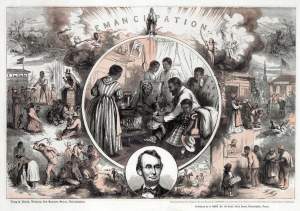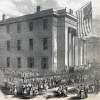Emancipation Policy (Garraty, 1994)
Textbook
The cost of war in blood and money was changing the way ordinary people in the North felt about slavery. Anger at southerners more than sympathy for slaves caused this change…Gradually Lincoln came to the conclusion that the United States should try to free all slaves. He would have preferred to have the states buy the slaves from their owners and then emancipate or free them. This idea was known as compensated emancipation. But Lincoln was a clever politician. He knew that many citizens would oppose paying anything to rebels and slave owners. Others still objected to the freeing the slaves for the sake of doing away with an evil institution. Lincoln therefore decided to act under his war powers. He would free slaves not because slavery was wrong but as a means of weakening the rebel government. This proclamation stated that after January 1, 1863, "all persons held as slaves with any States...in rebellion against the United States, shall be...forever free." Notice that Proclamation did not liberate a single slave that the government could control.
John A. Garraty, The Story of America (Austin: Holt, Rinehart, and Winston, 1994), 569-570.

























































